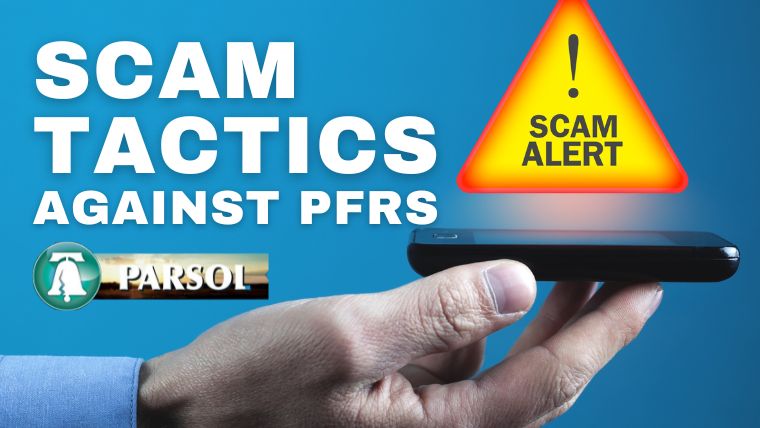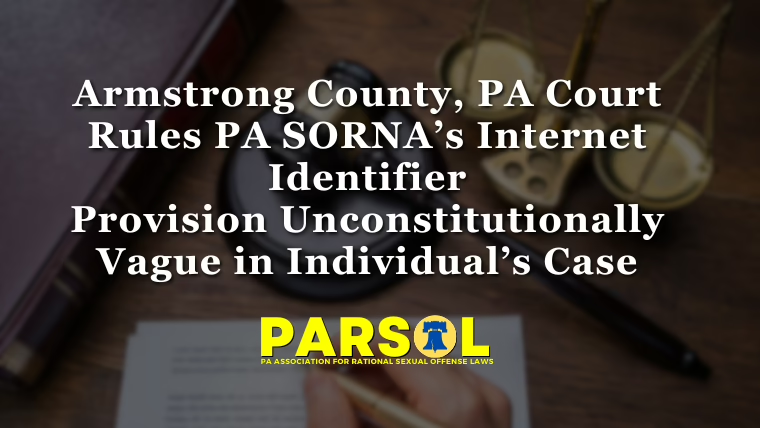Getting a phone call from someone identifying themselves as a law enforcement officer with the “Pennsylvania Megan’s Law” office informing you of an “issue” with your registration and getting some sort of threat is a terrifying experience.
Most people forced to register are doing their best to comply with the PA SORNA Registry. Data from the Pennsylvania State Police shows that in 2023, there were only 69 registration failures out of Pennsylvania’s more than 22,000 persons forced to register.
Still, the immediate panicked thought is, “Did I forget my registration date? Did I forget to update a piece of information? Did something in the law change that I’m not aware of?” The mind goes a mile a minute and sends the anxiety level through the roof. But, it’s a panic attack that can quickly be resolved with a call to the PA State Police, parole/probation officer, or the county courthouse to verify if what was said is true.
PARSOL receives member-submitted scam reports
PARSOL’s website features a form where scams and other incidents can be reported. We then catalog them into our system to sort their components for further analysis. The four elements we look at are who the call was from, what’s the issue, whether there is a threat of a warrant or arrest, and the demand. From there, we can look for patterns and anything unusual. The results are what we commonly expect to see.
It’s a scam!
There’s an excellent chance that it was a scam. For several years, we’ve been seeing an increase in scams targeting PFRs. And we don’t see a stop to it any time soon. So, what do these scams often look like? Read on.
Scammers Pose as Law Enforcement Officials: These scammers are mainly posing as officers from the county sheriff’s office or the PA State Police. A few have posed as a local officer and an officer from the county courthouse.
Scammers Spoof Phone Numbers: It’s also important to note that the phone numbers they call from are disposable. They’re created for single use only and cannot be traced. Scammers may also use phone number spoofers that even show up as their local police department. That’s why it’s so challenging to track scammers down for prosecution.
“Pay Money or Be Arrested” Threat
They then followed the threat of arrest or a warrant about to be filed. That’s the moment where the heart skips a beat or two because going back to prison would mean being separated from your family, losing your job, and starting back over again. The final piece is usually the demand of payment either in cash, card, or money order as the resolution, with the exchange happening in front of the courthouse, police department, or parole office. Notice the transaction is never to occur inside the designated location, only in front of it. The reason is for the scammer to give it the appearance of being official while at the same time not getting caught by actual officials. Frankly, the authorities will not call to let you know you’re going to be arrested as they would run the risk of you running. Furthermore, they will not demand payment as that is extortion.
“Travel Away from your Home” Scam
There is one incident submission that left me intrigued, as there was no payment demand. The PFR who reported this scam said someone posing as a lieutenant from their county courthouse called to inform him that a bench warrant for his failure to submit a DNA sample was about to be issued. The “lieutenant” claimed that the State Police Commissioner had issued a requirement for everyone on the Registry to give a new DNA sample at their local county courthouse. The lieutenant wanted him to call to confirm the appointment before leaving.
Instead of calling the originating number, he called the courthouse. Upon calling the courthouse, our PFR confirmed that this was indeed a scam. Not only did his county courthouse not do DNA collections there, but the police commissioner cannot change the rules around PA “Megan’s Law” without an act from the state legislature. While the normal scammer would’ve asked for money, it was suspected that they were trying to ensure he would be out of his house at a specific time so they could rob it. The courthouse is about 2 1/2 hours away from his home, guaranteeing them a 5-hour window if he had gone through with it.
“Fake Legal Services” Scam
Scammers often pose as attorneys or paralegals offering services to remove or expunge names from the registry. They exploit the desperation of individuals seeking ways to improve their circumstances. Victims end up paying substantial fees for services that are either fraudulent or, at best, ineffective.
“Blackmail and Extortion” Scam
Unscrupulous individuals may attempt to extort money from those on the registry by threatening to expose their status to the community or their place of employment. Fearful of the potential consequences, victims may succumb to these threats, further perpetuating their vulnerability.
This is the problem with the Public Pennsylvania Megan’s Law Registry.
These attempts by unscrupulous individuals to utilize information in the publicly accessible Pennsylvania Megan’s Law database to try to scam or harass PFRs are well beyond shameful. You can report your incidents to your local police department and the PA Attorney General’s Office. Unfortunately, chances are the scammers won’t get caught. The best thing you can do is familiarize yourself with these scam tactics, question the scammer, and submit an incident report to us. Your messages will help us better understand their game plan and, in turn, better inform you of what to look out for. You can submit your report by clicking on the Report an Incident/Scam at the top right of our website or below.
What have we missed?
If you have a scam type we should add to this article, please let us know in the comments or email us at legalinfo@parsol.org.




![stuckIn1995_rally_header - PARSOL - Pennsylvania Assoc for Rational Sex Offense Laws (PA Megan's Law Resources) PARSOL Board Chair Josiah Krammes speaks at the PA Capitol Rotunda flanked by State Reps. Emily Kinkead and Tim Briggs (28 Oct 2025) [John Dawe/PARSOL]](https://parsol.org/wp-content/uploads/2025/10/stuckIn1995_rally_header.avif)